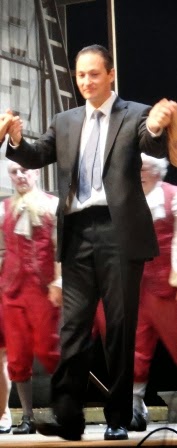(review in english below)
Alcina é uma
ópera de Georg Friedrich Händel com libretto de Antonio Fanzaglia segundo a ópera L’isola di Alcina de Riccardo Broschi, a partir do poema épico Orlando Furioso de Ludovico Ariosto.
A acção avança mais de um século e, na ária mais introspectiva
de Alcina do 2º acto, aparece-lhe a sua imagem como idosa (a mesma personagem
que faz de cupido). Este acto passa-se numa espécie de residência para doentes
psiquiátricos, sem ter sido claro para mim o significado da encenação.
No último acto vêem-se
os escombros do teatro, muito fumo (possivelmente terá ardido) e cai um grande
lustre (uma réplica do lustre da ópera de Zurique). A maioria dos participantes
está vestida como nos tempos actuais, mas Alcina aparece novamente com um
vestido “barroco”, antes de desaparecer.
O elenco de solistas foi de primeiríssima água:
*****
ALCINA , Zurich Opera House , February 2014
Alcina is an opera by Georg Friedrich Händel with libretto by Antonio Fanzaglia according to the opera L' isola di Alcina by Riccardo Broschi, after the epic poem Orlando Furioso by Ludovico Ariosto .
The witch Alcina turns men into animals on her island. She is in love with her latest prisoner Ruggiero. Bradamante, her bride, arrives in disguised as a man (Ricciardo), accompanied by her guardian, Melisso. Alcina´s spell causes Ruggiero to forget Bradamante . Morgana, Alcina’s servant, falls in love for "Ricciardo" , to the despair of Oronte, his beloved, also servant of Alcina. Oronte, jealous, convinces Ruggiero that Alcina loves "Ricciardo" . Alcina is torn when she discovers that Ruggiero betrayed her and plans to flee the island, and also discovers that her wand lost its powers. All the main characters reveal their true identities, Morgana and Oronte, and Ruggiero and Bradamante join in love and destroy the power and thepalace
of Alcina
Alcina is an opera by Georg Friedrich Händel with libretto by Antonio Fanzaglia according to the opera L' isola di Alcina by Riccardo Broschi, after the epic poem Orlando Furioso by Ludovico Ariosto .
The witch Alcina turns men into animals on her island. She is in love with her latest prisoner Ruggiero. Bradamante, her bride, arrives in disguised as a man (Ricciardo), accompanied by her guardian, Melisso. Alcina´s spell causes Ruggiero to forget Bradamante . Morgana, Alcina’s servant, falls in love for "Ricciardo" , to the despair of Oronte, his beloved, also servant of Alcina. Oronte, jealous, convinces Ruggiero that Alcina loves "Ricciardo" . Alcina is torn when she discovers that Ruggiero betrayed her and plans to flee the island, and also discovers that her wand lost its powers. All the main characters reveal their true identities, Morgana and Oronte, and Ruggiero and Bradamante join in love and destroy the power and the
Christof Loy 's staging is fine but hard to understand. It begins with the representation (magnificent) of a rococo baroque opera in a theater at the top of the stage , while at the bottom the backstage is seen, where the animals transformed by Alcina lay. A very old cupid appears, a very interesting idea.
The action progresses over a century, and during the more introspective Alcina’s aria in 2nd act, her image as an old woman appears (it is the same player that plays the cupid). . This act takes place in a sort of residence for psychiatric patients, without being clear to me the meaning of the act.
In the last act we see the ruins of the theater, a lot of smoke (possibly it burned ) and a large chandelier (a replica of the chandelier of the
Conductor
(and flautist) Giovanni Antonioni
superiorly directed the great Baroque Orchestra La Scintilla. The performance was fantastic, taking full advantage
of the sonority of baroque instruments.
The soloists were of the highest quality:
The soloists were of the highest quality:
Alcina was
interpreted by Italian mezzo Cecilia
Bartoli. I confess that it was she who made me go to Zurich
Sensational
was Swedish mezzo Malena Ernman as
Ruggiero. Before the start of the performance we were told that she would not
be at her best due to a respiratory infection But this limitation was not
apparent because she offered an exceptional performance. She is a complete
artist. Physically looked like a man, her agility on stage was stunning. In the
3rd act she joined the group of professional dancers and she even sang doing
pushups (!) . Apart
from all these physical and staging attributes, her voice has a beautiful tone,
an unusual power and impressive coloratura. Wonderful.
Bradamante
was Armenian mezzo Varduhi Abrahamyan,
an unknown singer to me who was also great both on stage and vocally. Her tone
is beautiful abd dark, and the performance onstage was always excellent.
French soprano Julie Fuchs was a very good Morgana, with a nice and very audible voice and onstage always a nice performance.
Oronte was interpreted by the young Swiss tenor Fabio Trümpy. He has a bright and expressive voice .
Also another young singer, American bass Erik Anstine, played Melisso with an interesting and very nice vocal power.
A stratospheric Alcina in Zürich Opernhaus.
*****
French soprano Julie Fuchs was a very good Morgana, with a nice and very audible voice and onstage always a nice performance.
Oronte was interpreted by the young Swiss tenor Fabio Trümpy. He has a bright and expressive voice .
Also another young singer, American bass Erik Anstine, played Melisso with an interesting and very nice vocal power.
A stratospheric Alcina in Zürich Opernhaus.
*****









.JPG)







































